
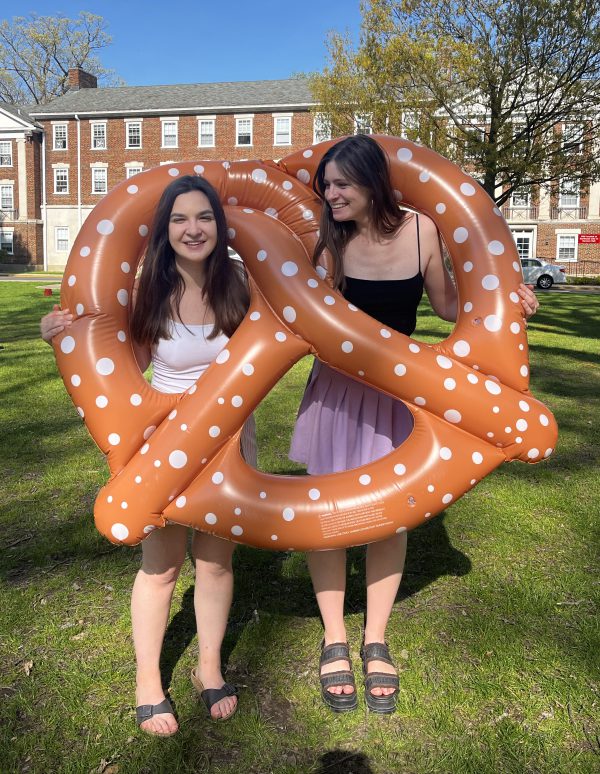

When Claudia Klos left France for Kalamazoo College in fall 2022, she was afraid she would be homesick for her parents.
Now, in summer 2023, she has the opposite problem.
“Life got so busy at K, that this void which is created when we leave our home is immediately filled with new discoveries, new people, new friendships, new places and new activities,” Klos said. “Kalamazoo was a great place for me to fill this void from home, so much that now that I’m back home, I feel this void again—a new kind of void that was created when I left K.”
Klos came to Kalamazoo via Sciences Po Strasbourg, which she chose for the same reasons many students choose K: an emphasis on multidisciplinary studies and spending time abroad—a mandatory experience for Sciences Po Strasbourg students.
Born and raised in the western suburbs of Paris with Polish heritage, Klos had never thought she would study in the U.S. due to the distance and expense. When she learned about the opportunity to study at K and work as a French teaching assistant, however, she immediately wanted to go.
“I’ve always loved languages and I really thought it would be a great experience for me,” Klos said. “I think that giving myself some responsibilities would do me only good. I wanted to challenge myself. The financial benefits of being a TA were obviously part of the decision, too.”
Along with two other students from France who worked as TAs at K over the past academic year, Klos had the opportunity before coming to Kalamazoo to meet with Asia Bennett, assistant director and exchange student advisor with the Center for International Programs (CIP), as well as K students who were studying abroad in Strasbourg.
“It was very nice meeting them and knowing that we would see each other on the other side of the Earth a little bit later,” Klos said. “The CIP does amazing work. I felt very listened to, they have very fast answers to your questions, and every step was made clear.”
Before she arrived in Kalamazoo on her 21st birthday in September 2022, Klos was hoping that the French classes for which she was a TA would go smoothly.
“I was also hoping for a year of discoveries,” she said. “It’s a once-in-a-lifetime adventure so we better not waste it. Those discoveries came with traveling, meeting people and sharing the lives of people we encounter on the other side of the planet, and discovering the life of the student in America to be able to compare it to the life of European students. I was hoping to live this amazing, once-in-a-lifetime experience to the fullest.”
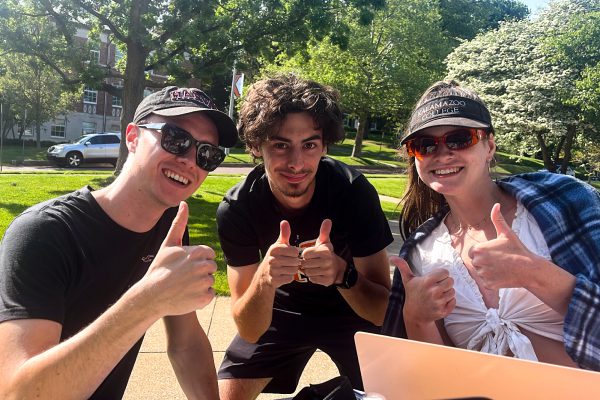
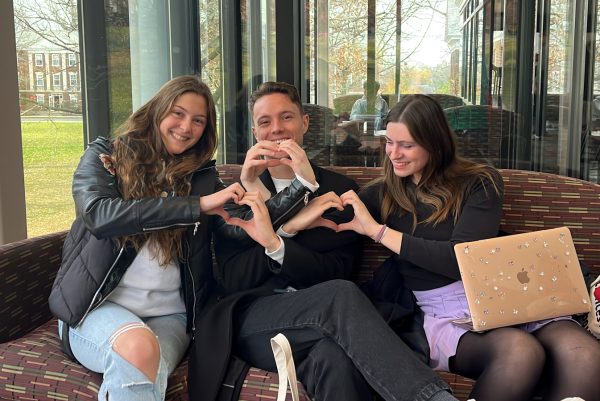
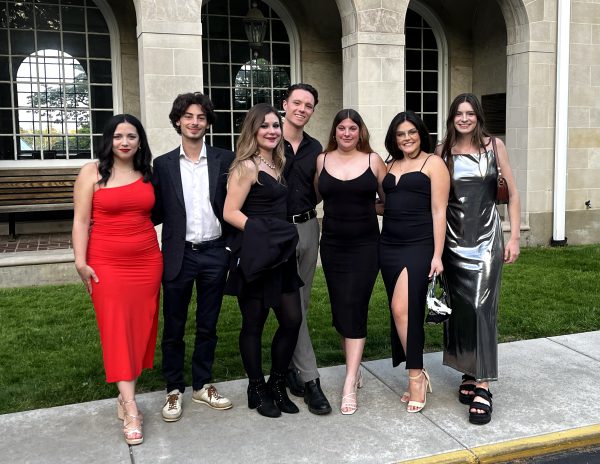
Her first impressions were that K was charming and very green. She loved the beauty, comfort, common spaces and fireplaces in her dorm, Harmon Hall, and in the library.
Klos appreciated the chance to speak English in everyday life and experience American student life, which she found different in many ways. She was surprised by how students were encouraged to participate in sports and the arts. In addition to attending concerts and shows, Klos participated in intramural volleyball.
“This year made me want to engage myself in some team sports,” she said. “The energy it had at K was amazing and that is something I will remember.”
The residential campus offered another difference from Klos’ life as a student in France, where she had attended a rigorous prep school that demanded the majority of her time and energy.
“My social life had never been as rich as at K, where we were always around people,” Klos said. “We were with people in class and out every day, and actually, I didn’t get tired of it. People talk about social batteries lowering down, which I understand, but I was surprised with not having this problem and being happy to always be around people.”
The close relationships engendered by the residential campus helped Klos learn about herself, grow personally, and develop a more balanced approach to school, rest and life.
“Since I knew that my time at K was limited, the fact that the experience was evanescent made it precious,” she said. “I learned to find a balance because I never thought about doing so before in my life. Before, the academic part always dominated, whereas here, the social dimension of the experience dominated, too, so I needed to manage both. We would have study sessions in the DeWaters Hall basement, and nobody would really advance in book work. Everybody would chat and laugh, and we would say, ‘No, we’re not studying, we’re creating memories!’ This is something we would say ironically, but it was still accurate, and that’s something important I learned from this year thanks to friendships.”
When interpersonal conflicts or difficulties arose, Klos reminded herself that they wouldn’t last long.
“I would think about how lucky I am to be finding myself so far away from home with amazing people in an amazing place,” she said. “In January, I was feeling down, so I started making a list of things I am grateful for. Before sleeping, I would write down something nice that happened each day, even if it was something little. It contributed to making me remember how amazing this experience was despite having troubles.”
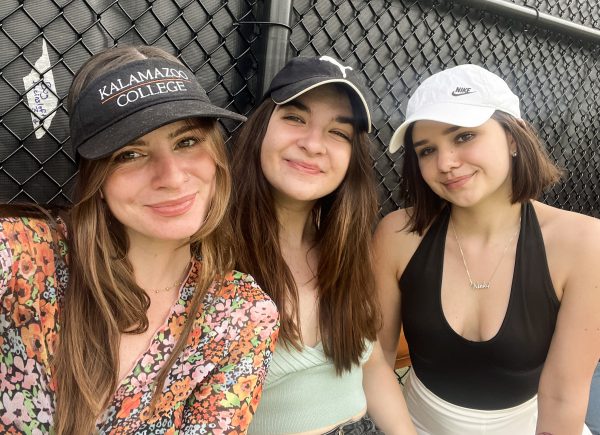
One of those concerns was the consumption of resources she saw in the U.S.
“I had a problem with the air conditioning,” Klos said. “I thought that it was a waste of energy, of CO2 emissions. Also, the fact that the lights were on all the time stuck with me. I noticed contrasting details of everyday life between the U.S. and Europe; for example, there is so much water in the bowl of the toilets. They still give plastic bags everywhere. I’m trying to understand all the differences and I see how American culture assures abundance and emphasizes comfort rather than resources.”
While Klos enjoyed all her classes, especially political science, she was initially caught off guard by the differences between college courses in France and Kalamazoo.
“In the fall term, I was there with my computer ready to be tapping and tapping and tapping, because that is how we do that in European universities,” Klos said. “That was not the case at all. We had a teacher that asked us questions, we’re doing exercises together; it’s not just the teacher giving us this material and us absorbing it. I wasn’t aware that I was supposed to do all these readings for every class, I didn’t even know that there was a syllabus, it was very confusing. But then in spring, I was prepared, and I knew how things worked. Then I really liked this approach of us doing readings, so accumulating some knowledge, and then being able to reflect over that with the professor making the lecture but also having class discussions with us.”
She particularly appreciated how language classes are taught at K (Klos took German in addition to being a TA for French), and the relationships between students and professors. Associate Professor of French and Francophone Studies Aurélie Chatton provided support, openness and a listening ear for all the French TAs. While she initially did not want to take the economics classes Sciences Po Strasbourg required, Klos found encouragement and positive challenge from Department Co-Chair and Edward and Virginia Van Dalson Professor of Economics Patrik Hultberg and Assistant Professor of Economics Darshana Udayanganie.
“I really liked the concept of office hours and the relationship between students and professors,” Klos said. “In France, we don’t feel close at all to our teachers. I used office hours a lot and I’m grateful to every professor for making them. Thanks to these relationships, I could navigate classes more easily. It feels good when professors are demanding because it brings us up.”
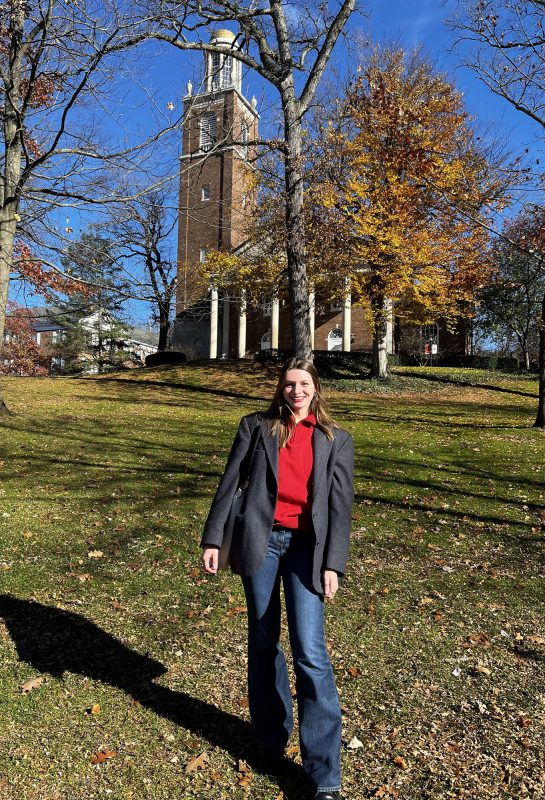
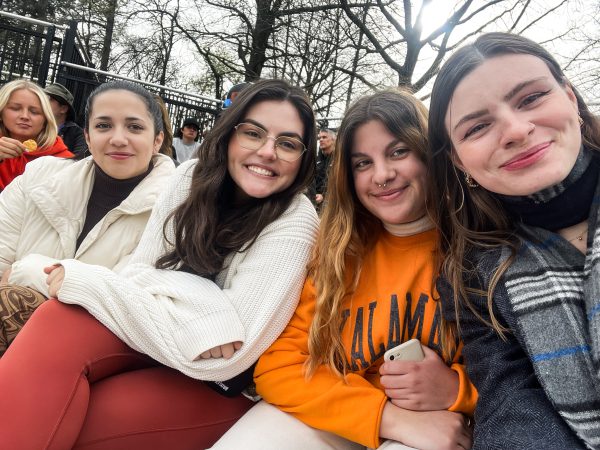

That balance of challenge and support was evident for Klos in her relationship with Political Science Professor and William Weber Chair of Social Science Amy Elman.
“All of the challenge was rewarded since she got to know us and know our center of interest,” Klos said. “The professors were a big part of my experience.”
Knowing Klos’ interests, Elman recommended her for EP-JMN Summer School, a June program at the University of Salamanca in Spain, where Klos met students from different parts of Europe and learned more about the European Union and various cultures.
This fall, her travels will continue with a September program in eastern France that includes educational seminars followed by opportunities to teach the topics to school children.
“I know that I got into that program thanks to my experiences at K, because I told them, ‘Listen, I’ve been teaching French in the U.S. for one year. I know how to present subjects and to deal with a class.’”
Then, in October, Klos will begin a year of study in Krakow, where she looks forward to living for the first time in the country of her family’s heritage.
“It’s going to be another amazing experience away from France that waits for me,” Klos said. “When one is abroad, everything is an amazement—the most boring streets, the most boring cars and houses for a local person—it is an amazement for a foreigner. I liked taking walks in the cemetery near campus, and it looks nothing like a cemetery in Europe. Just walking in Kalamazoo streets, the houses are so American. The most basic thing is so specific to this country I’m in, and so different from home, even though it’s the same thing. I think that we go back to childhood when we study abroad because we discover new things all the time. The most boring things become amazing, and we have stars in our eyes every time we see the most random thing, the most basic thing. That happens when we go abroad, so I would encourage anyone who is thinking about studying abroad to go for it.”
